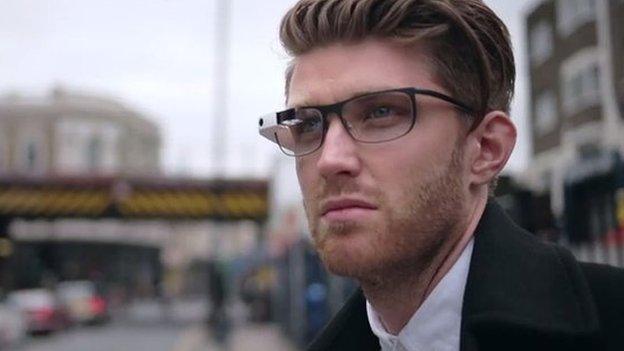Google I/O protesters heckle at developer event
- Published
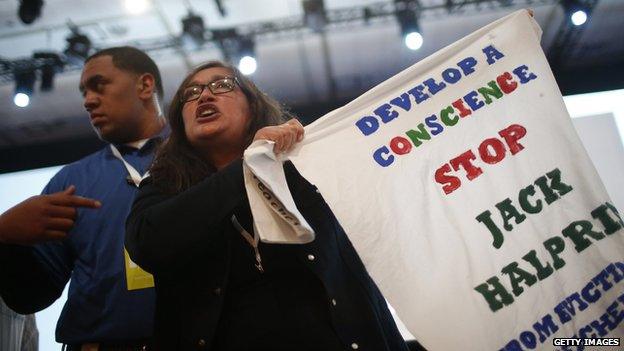
One of the protests was regarding a dispute about tenants in a San Francisco residential block
Google has announced a raft of new services and products at its annual developer conference - but its event was twice interrupted by protesters.
One woman held up a sign reading "develop a conscience", while another shouted that the firm was creating "machines that kill people".
The yearly Google I/O event is a chance for the firm to show off its latest products and plans.
Google could not be reached for comment about the interruptions.
Away from the event, at Google's headquarters in Mountain View, another group of people were reportedly arrested, external in a separate incident regarding the ongoing "net neutrality" debate.
'Stop Jack Halprin'
Google launched this year's event with a keynote presentation lasting about two hours.
During a segment explaining an enhanced battery-saving feature on a forthcoming software release, a protester could be heard shouting the name of Jack Halprin, a Google lawyer.
Richard Taylor recaps Google's headline announcements
Mr Halprin has been at the centre of a row involving tenants living in a residential block he purchased.
The protester held a sign saying "stop Jack Halprin from evicting SF teachers".
On stage, Google engineer David Burke attempted to deflect attention from the disturbance by jokingly suggesting the better battery life would come in useful during a "long protest".
Robotics heckle
Later during the same keynote address, a man was removed by security staff shortly after shouting "you all work for a totalitarian company that builds robots that kill people".
Last year, Google acquired Boston Dynamics, a company that had previously developed sophisticated robotics for the US military.
A protester shouts out during a Google keynote presentation in San Francisco.
Google said at the time that it would honour existing contracts Boston Dynamics had with the Pentagon's Defense Advanced Research Projects Agency (Darpa).
Over the past year there has been increased friction between long-time San Francisco residents and what some have dubbed the "Silicon Valley tech elite".
Buses used to shuttle Google employees from residential areas to the company's campus have become a target for anger - with some protesters standing in the vehicles' way. In some cases buses have been vandalised.
San Francisco locals said they were concerned that an increase in the numbers of wealthy technology workers was driving up the cost of living in the city.
Android everywhere
Google will be keen to make sure the focus remains on its new announcements at I/O, of which there were many.
Aside from a closer look at new smartwatch hardware, the company was excited to show off major updates to its Android operating system, which has had a visual refresh.
One feature that impressed the audience was smarter phone unlocking - if a handset owner's paired smartwatch is detected nearby, the phone will not require a password to unlock it.

Analysis: Richard Taylor, North America technology correspondent
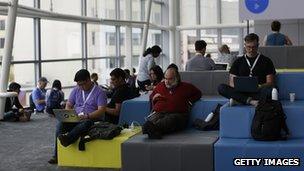
Thousands of developers attend the event every year
Google's agenda-setting conference is ostensibly aimed squarely at developers - but while there were no great surprises, there was plenty to interest users too.
Android already has impressive market share in developing markets - but with overall smartphone adoption running at just 10%, Android One is a way for Google to consolidate its presence by delivering users affordable hardware and an up-to-date Google-supported software experience; in the process it delivers a blow to rivals including Microsoft.
But its renewed attempt at capturing the living room TV will be a harder nut to crack - the market is more crowded than it was when it launched its first disastrous foray with Google TV four years ago.
Lots of users already have capable set-top boxes, many TV makers (notably Samsung) have already established their own interfaces or partnerships, and others (like Logitech) have sour memories of their failed partnership.
Similarly, Google has yet to move convincingly into enterprise; despite walling-off business data and enhanced security, many IT administrators will take some convincing to adopt a platform which has become synonymous with malware.
With so many software products across multiple devices - from PCs, mobile and the living room to new arenas like our cars, and even our wrists - it is little surprise that Google is aiming for greater consistency between them.
The cleaner and unifying "material design" in the new version of Android will help deliver a slicker experience. It should help shed Android's reputation as a disjointed and chaotic experience, and maybe - just maybe - give some Apple users pause for thought.

Android TV
Google also used the event to unveil Android TV. The platform is designed to work on big screens, and can be controlled by items such as a person's smartphone, games controller or, eventually, smartwatch.
"We're giving TV the same level of attention that phones and tablets have enjoyed," said Mr Burke, on stage.
Sony, Sharp and TP Vision - which manufactures Philips' products - will all release smart TVs using Google's software.
Google has attempted to get stuck into the TV market several times before with little success - although its most recent TV-related launch, the Chromecast, has been well-received by consumers.
Log-in and drive
Also shown off at the event was Android Auto, the company's attempt to get its software into the dashboards of popular cars.
The mostly voice-activated system is being experimented with by car makers including Ford, Honda, Audi and Volkswagen - but should not be confused with Google's continued efforts to create a driverless car.
The firm's new Google Fit service hopes to provide a central place for people to track all the health data gathered from fitness apps. The system has the likes of Nike and Adidas on board.
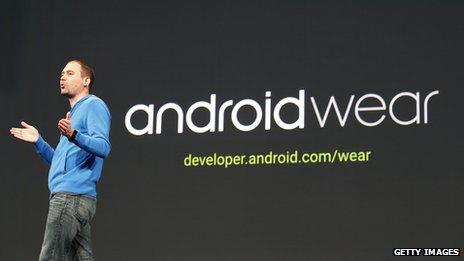
Android Wear is a new offshoot system for wearable devices such as watches
Android One is at the other end of the tech spectrum - the scaled back software is designed to work on phones used primarily in the developing world.
Absent from the keynote speech were any significant developments involving Google Glass eyewear or the firm's social network, Google+.
As is typical at the developer event, those in attendance were all given free devices.
One item this year was a cardboard box which could be folded into a makeshift virtual reality headset - a playful joke aimed at Facebook, which acquired virtual reality outfit Oculus VR earlier this year for about $2bn (£1.2bn).
Details of Google's slightly less expensive do-it-yourself hardware were posted online, external.
Follow Dave Lee on Twitter @DaveLeeBBC, external
- Published25 June 2014
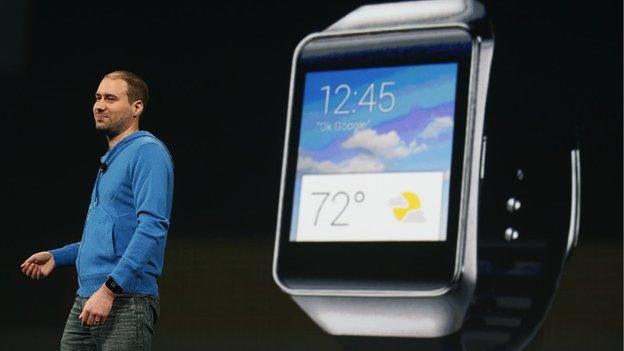
- Published25 June 2014

- Published24 June 2014
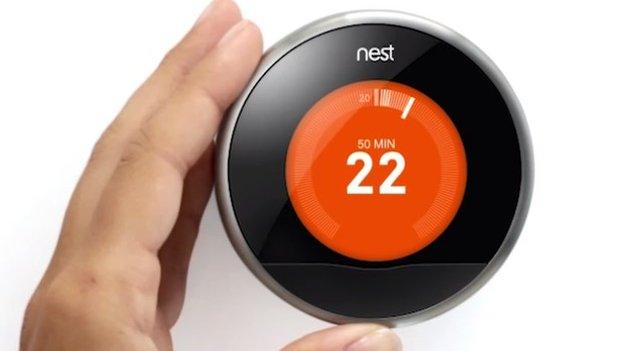
- Published23 June 2014
